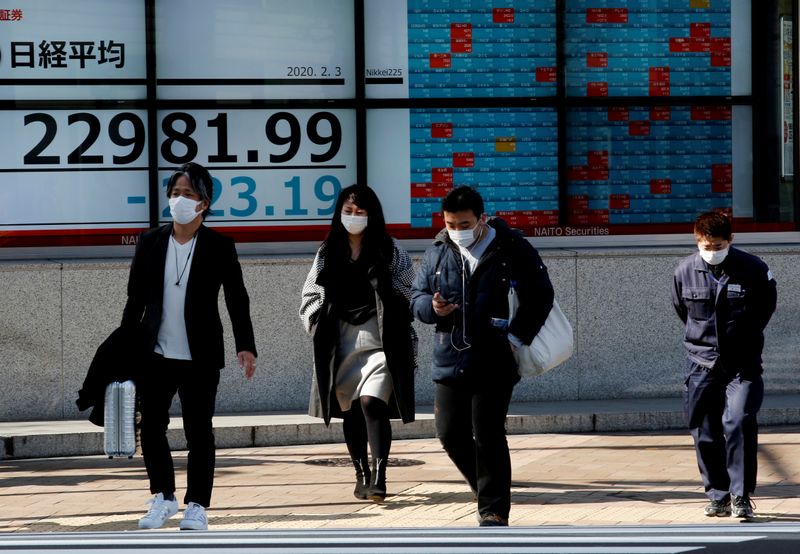By Wayne Cole
SYDNEY (Reuters) - Asian share markets found some stability on Tuesday after a wave of early selling petered out and Wall Street futures managed a solid bounce, allowing investors to take a breather from coronavirus fears.
Some dealers cited a Wall Street Journal report on a possible vaccine as helping sentiment, though human tests of the drug are not due until the end of April and results not until July or August.
Whatever the cause, E-Mini futures for the S&P 500 (ESc1) bounced 0.7% to pare some of the steep 3.35% loss the cash index (SPX) suffered overnight. EUROSTOXX 50 futures (STXEc1) also added 0.6%, and FTSE futures (FFIc1) nudged up 0.3%.
South Korea's hard-hit market (KS11) eked out a 0.6% rise and helped MSCI's broadest index of Asia-Pacific shares outside Japan (MIAPJ0000PUS) fight back to flat.
Japan's Nikkei (N225) was still down 3.4%, catching up to the global sell-off having been shut on Monday, while Shanghai blue chips (CSI300) eased 1.6%.
European and U.S. stocks had suffered their biggest loses since mid-2016 amid fears the coronavirus was morphing into a pandemic that could cripple global supply chains and wreak far greater economic damage than first thought.
The risks were such that bond markets were wagering central banks would have to ride to the rescue with new stimulus.
Futures for the Federal Reserve funds rate <0#FF:> have surged in the last few days to price in a 50-50 chance of a quarter-point rate cut as early as April. In all, they imply more than 50 basis points of reductions by year end.
Central banks across Asia have already been easing policy, while governments have promised large injections of fiscal stimulus, something western countries might also have to consider.
The Dow (DJI) had ended Monday down 3.55%, while the S&P 500 (SPX) lost 3.35% and the Nasdaq (IXIC) 3.71%. Wall Street's fear gauge, the CBOE Volatility Index (VIX), jumped to its highest close since early 2019.
Underlining the economic impact of the virus was a 3.5% drop in Apple Inc (O:AAPL) as data showed sales of smartphones in China tumbled by more than a third in January.
GRAPHIC: Asia stock markets https://product.datastream.com/dscharting/gateway.aspx?guid=516bc8cb-b44e-4346-bce3-06590d8e396b&action=REFRESH
BONDS BET ON RATE CUTS
The coronavirus death toll climbed to seven in Italy on Monday and several Middle East countries were dealing with their first infections, feeding worries it could turn into a pandemic.
"If travel restrictions and supply chain disruptions spread, the impact on global growth could be more widespread and longer lasting," said Jonas Glotermann at Capital Economics.
"While we still think that it would take a significant deterioration in the outlook for the U.S. economy for policymakers to cut rates, they may feel compelled to do so if the virus spreads and leads to continued falls in the stock market and inversion of the Treasury yield curve."
The rush to bonds left yields on 10-year Treasury notes (US10YT=RR) at 1.39%, down almost 20 basis points in just three sessions and paying less than overnight rates. Yields were now rapidly approaching the all-time low of 1.321% hit in July 2016.
The sharp drop, combined with the simple fact the Fed had far more room to cut rates than its peers, kept the U.S. dollar restrained after a run of strong gains.
The euro edged up a little from recent three-year lows to reach $1.0862 (EUR=), while the dollar was back at 110.83 yen
Against a basket of currencies, the dollar dipped a fraction to 99.239 (=USD).
Gold ran into profit-taking after hitting a seven-year peak overnight, and was last at $1,655.34 an ounce
Oil steadied after shedding nearly 4% on Monday. U.S. crude (CLc1) was up 11 cents at $51.54, while Brent crude (LCOc1) firmed 19 cents to $56.49.

GRAPHIC: Asia stock markets https://product.datastream.com/dscharting/gateway.aspx?guid=516bc8cb-b44e-4346-bce3-06590d8e396b&action=REFRESH